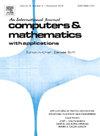具有弱初始奇异性的二维半线性时间分数阶反应扩散方程的快速ADI紧致有限差分法的收敛性分析
IF 2.5
2区 数学
Q1 MATHEMATICS, APPLIED
引用次数: 0
摘要
在本文中,考虑到解的弱初始奇异性,给出了模拟二维半线性时间分数反应扩散方程(TFRDE)的有限差分法的严格误差分析。Kumari和Roul(2024)[31]最近引入的ADI方法用于解决一类线性tfrde遇到的网格参数调整问题和忽略导数边界,这可能使最新的方法存在缺陷和错误。本研究旨在为半线性TFRDEs设计一种计算效率高的L1 ADI方案,并提供全面的误差分析。为了解决解决方案的本质非局部特征,我们对时间分数阶导数的奇异核采用指数和近似,在具有不等时间步长的梯度网格上,在初始点附近产生更密集的网格。因此,我们有效地缓解了高存储和计算需求,并将收敛点返回到其最优状态。用四阶紧致有限差分算子处理这两个空间变量。此外,利用交替方向隐式方法将导出的二维系统分解为两个独立的一维问题,计算其解。借助局部截断误差估计和离散分数阶Grönwall不等式,通过离散能量法对该方案进行了严格的稳定性和收敛性分析。数值结果证实了收敛性分析,突出了数值格式的计算效率。数值算例验证了快速紧凑ADI方法的CPU性能,并进行了比较,清楚地展示了分级网格增强收敛顺序以获得最优结果的有效性。本文章由计算机程序翻译,如有差异,请以英文原文为准。
Convergence analysis of a fast ADI compact finite difference method for two-dimensional semi-linear time-fractional reaction-diffusion equations with weak initial singularity
In this work, considering the solution's weak initial singularity, a rigorous error analysis of a finite difference method for simulating a two-dimensional semi-linear time-fractional reaction-diffusion equation (TFRDE) is presented. The recently introduced ADI method by Kumari and Roul (2024) [31] for solving a class of linear TFRDEs encounters with problematic mesh parameter adjustments and ignorance of the derivative bounds, potentially rendering the latest methodology deficient and erroneous. The present study aims to design a computationally efficient L1 ADI scheme for semi-linear TFRDEs and provide a comprehensive error analysis. To address intrinsically non-local characteristics of the solution, we employ sum-of-exponential approximation to the singular kernel of time-fractional derivative on a graded mesh with unequal time-steps that yield denser mesh near the initial point. As a result, we effectively mitigate the high storage and computational requirements and return the convergence point to its optimal state. The two spatial variables are treated with a fourth order compact finite difference operator. Moreover, an alternating direction implicit method is utilized to compute the solution of the derived two-dimensional system by splitting it into two separate one-dimensional problems. With the aid of local truncation error estimate and discrete fractional Grönwall inequality, the stability and convergence analysis of the scheme are carried out rigorously through the discrete energy approach. The numerical results corroborate the convergence analysis and highlight the computational efficacy of the numerical scheme. Numerical examples demonstrate the CPU performance of the fast compact ADI method, and presented comparisons distinctly showcases the effectiveness of the graded mesh enhancing convergence order to achieve optimal results.
求助全文
通过发布文献求助,成功后即可免费获取论文全文。
去求助
来源期刊

Computers & Mathematics with Applications
工程技术-计算机:跨学科应用
CiteScore
5.10
自引率
10.30%
发文量
396
审稿时长
9.9 weeks
期刊介绍:
Computers & Mathematics with Applications provides a medium of exchange for those engaged in fields contributing to building successful simulations for science and engineering using Partial Differential Equations (PDEs).
 求助内容:
求助内容: 应助结果提醒方式:
应助结果提醒方式:


